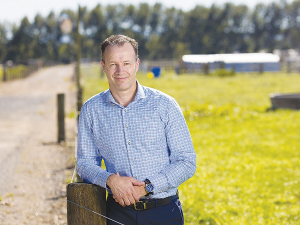State of the Dairy Nation 2024/25: DairyNZ Highlights Record Milk Production and Export Growth
DairyNZ's chief executive Campbell Parker says the 2024/25 dairy season reinforces the importance of the dairy sector to New Zealand.
 DairyNZ chief executive Tim Mackle believes the new Centre for Climate Action on Agricultural Emissions will accelerate technology and tools to really drive further farm emissions reductions.
DairyNZ chief executive Tim Mackle believes the new Centre for Climate Action on Agricultural Emissions will accelerate technology and tools to really drive further farm emissions reductions.
DairyNZ chief executive Tim Mackle says reducing agricultural greenhouse gas emissions "is a tough nut to crack".
Mackle says work is continuing to find additives, genetics and vaccines for New Zealand farming systems.
He says the Government's R&D commitment of $339 million to reduce farm emissions is "a shot in the arm" and will help Kiwi dairy farmers remain high-performing.
Mackle told Rural News that there has been progress and some technology close to being available.
"There are some serious candidates for our pasture-based system. But because Kiwi dairy farmers are already so efficient, there's no silver bullet," he adds.
"We need new high-impact technologies and to accelerate their uptake to continue reducing our environmental footprint, while enabling farmers to run successful businesses."
Mackle notes that DairyNZ has worked with the Government to ensure they understand the scale of the climate change challenge affecting farmers, and the opportunity to remain world-leading sustainable dairy producers.
"DairyNZ has advocated strongly for Government to invest significantly more in supporting the sector to play its part to address climate change."
He says the $339m fresh funding is a step in the right direction to accelerate the development of new technology needed on-farm as soon as possible, and to support farmers to adopt these tools.
"We'll continue to advocate for how this R&D funding is invested, as new solutions develop. This will bring the best outcomes for farmers and New Zealand into the future," says Mackle.
Kiwi dairy farmers already have the world's lowest carbon footprint for on-farm milk production and want to retain that competitive advantage - to continue contributing for their families, the economy and local communities.
"We already have a world-leading position with low carbon dairy and a world-first emissions reduction plan in He Waka Eke Noa.
"This new increased investment will help dairy improve out position even further."
Mackle says the dairy sector, including DairyNZ, is investing in a range of research into new solutions, including methane inhibitors and low methane feeds. He adds it is also working together on ways to adapt overseas technology solutions to New Zealand farming systems.
"The sooner we get new technology for farmers, the sooner we will meet our goals," says Mackle.
Mackle also welcomed the establishment of the new Centre for Climate Action on Agricultural Emissions.
"It will accelerate the development of technology and tools to really drive further emissions reductions by the ag sector," he says.
Donald Trump's latest tariff tantrum has again thrown the world of trade into a new round of turmoil and uncertainty, and NZ is caught up in it.
The third edition of the NZ Dairy Expo, held in mid-February in Matamata, has shown that the KISS principle (keep it simple stupid) was getting a positive response from exhibitors and visitors alike.
Twenty years ago, South African dairy farm manager Louis Vandenberg was sent to a farm in Waikato to provide training on Afimilk technology.
Strong farmgate milk price is helping boost investment on farms, says PGG Wrightson chief executive Stephen Guerin.
Fonterra's 460 milk suppliers in Australia, who will switch to Lactalis end of this month, are unfazed with the impending change.
The 5+ A Day Charitable Trust has launched a collection of affordable recipes designed to turn everyday vegetables into seasonal stars.

OPINION: A mate of yours truly reckons rural Manawatu families are the latest to suffer under what he calls the…
OPINION: If old Winston Peters thinks building trade relations with new nations, such as India, isn't a necessary investment in…